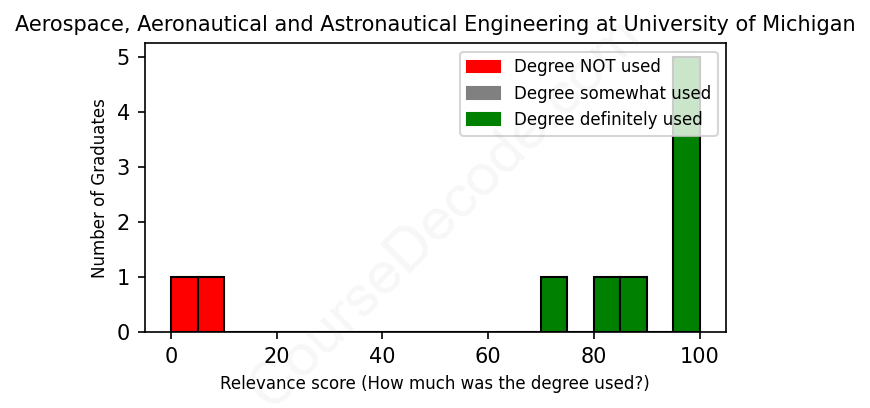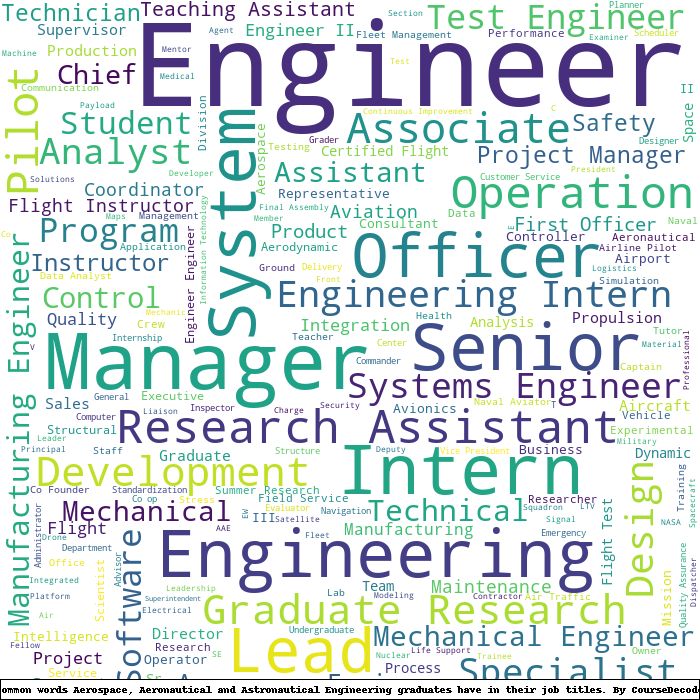
First, some facts. Of the Aerospace, Aeronautical and Astronautical Engineering graduates from University of Michigan we've analyzed , here's how many have used (or NOT used) their degree in their career:

These are estimates based on AI analysis of 10 LinkedIn profiles (see below).
The verdict? Above average. Overall, with an average relevance score of 74%, Aerospace, Aeronautical and Astronautical Engineering graduates from University of Michigan have a higher likelihood (+7%) of finding work in this field compared to the average graduate across all fields:
And for comparison, here's the chart for all profiles we've looked at across all degrees.
Also, after graduating, 50% of these graduates have pursued further education other than another Bachelor's degree (such as a Masters degree or other), compared to the average across all profiles of 35%. This suggests you may need more than just a Bachelors degree to be competitive as a Aerospace, Aeronautical and Astronautical Engineering graduate.
See the details:
|
Relevance score: 100% We think this person has gone into a career highly relevant to their degree. We think this person has gone into a career highly relevant to their degree.
DEGREE INFOGraduated in 2021 from University of Michigan with a Bachelor's degree in Aerospace, Aeronautical and Astronautical Engineering. No other secondary education since. JOB HISTORY SINCE GRADUATIONAerospace Engineer Array of Engineers May 2021 - Present ABOUTNo information provided. |
The top 10 most common jobs done by the graduates we've analyzed (ranked most common to least) are:
When you look at the job trajectories of people who studied Aerospace, Aeronautical, and Astronautical Engineering at the University of Michigan, it becomes pretty clear that many of them have landed roles that are highly relevant to their degree. Common positions include Aerospace Engineer, Systems Engineer, and various roles within manufacturing engineering at companies like Gulfstream and Northrop Grumman. These jobs directly apply the knowledge they acquired in school, allowing them to work on projects that involve aerodynamics, propulsion systems, and various aerospace technologies. It’s exciting because they get to use what they've learned in a real-world context!
However, it’s interesting to note that not every job is directly related to aerospace engineering. Some alumni found themselves in roles like project management or teaching, which, while they may utilize some engineering skills, don’t specifically draw on the aerospace expertise they studied. For instance, a Manager at a tennis club or a Data Scientist at Amazon may not be using their aerospace knowledge at all. So, while a significant number of graduates are indeed working in relevant fields, there’s a mix, and some have ventured into roles that may not capitalize on their specialized education.
Here is a visual representation of the most common words in job titles for Aerospace, Aeronautical and Astronautical Engineering graduates (this is across all Aerospace, Aeronautical and Astronautical Engineering graduates we've analyzed, not just those who went to University of Michigan):

Overall, it looks like graduates from the University of Michigan who studied Aerospace, Aeronautical, and Astronautical Engineering tend to have pretty solid career trajectories, especially within their field. For many of them, their first jobs after graduation are often engineering roles, either directly in aerospace companies or in related technical positions. You can see that a lot of the 2011 to 2018 graduates have landed jobs at well-known aerospace corporations like Gulfstream Aerospace, Northrop Grumman, and Aerojet Rocketdyne, which suggests they’re getting into relevant fields pretty quickly.
Fast forward five to ten years, and many of these professionals seem to have moved up significantly in their careers. For instance, graduates from 2015 and 2017 have transitioned into managerial positions, like Data Science Manager at Amazon and Technical Team Lead, respectively. This advancement shows that they’re not just sticking to entry-level roles but are climbing the ranks and taking on more responsibility. However, it's worth noting that not everyone ends up in an aerospace-specific job; there are a few exceptions, like one graduate who became a math teacher, which indicates that despite having a degree in engineering, not all paths lead directly to aerospace. Overall, though, it seems like a degree from Michigan definitely helps set up a strong foundation for success in aerospace engineering careers.
Alright, so let’s be real—getting a Bachelor’s degree in Aerospace, Aeronautical, and Astronautical Engineering is no walk in the park, especially at a place like the University of Michigan, which is super prestigious in this field. This program is generally considered quite challenging due to its heavy emphasis on math, physics, and engineering principles, along with some intense hands-on projects. You’ll definitely face some tough coursework and late nights studying or tweaking designs. It’s definitely on the harder side compared to many other bachelor’s degrees out there, so if you’re up for diving into complex problem-solving and really hitting the books, it could be an awesome, albeit challenging, journey!
Most commonly, in the LinkedIn profiles we've looked at, it takes people 4 years to finish a Bachelor degree in Aerospace, Aeronautical and Astronautical Engineering.
It looks like the graduates from the University of Michigan's aerospace, aeronautical, and astronautical engineering programs have generally landed pretty decent jobs, indicating they've made some good money. For example, the folks landing positions at big companies like Gulfstream Aerospace and Amazon are likely raking in solid salaries, especially with roles like Data Science Manager or Principal Satellite Systems Engineer. Even those starting in teaching or more entry-level positions have moved up in their fields over time, which can be a great way to boost their income. Overall, I'd say they seem to be doing well financially, especially compared to many graduates from other disciplines.
Here is a visual representation of the most common words seen in the "about" section of LinkedIn profiles who have a Bachelor degree in Aerospace, Aeronautical and Astronautical Engineering (this is across all Aerospace, Aeronautical and Astronautical Engineering graduates we've analyzed, not just those who went to University of Michigan). This may or may not be useful:

Here are all colleges offering a Bachelor degree in Aerospace, Aeronautical and Astronautical Engineering (ordered by the average relevance score of their Aerospace, Aeronautical and Astronautical Engineering graduates, best to worst) where we have analyzed at least 10 of their graduates:
| College | Score | Count |
|---|---|---|
 Texas A&M University Texas A&M University
|
87 | 22 |
 California Polytechnic State University-San Luis Obispo California Polytechnic State University-San Luis Obispo
|
86 | 12 |
 University of Cincinnati University of Cincinnati
|
86 | 10 |
 Purdue University Purdue University
|
85 | 40 |
 Rensselaer Polytechnic Institute Rensselaer Polytechnic Institute
|
85 | 17 |
 Georgia Institute of Technology Georgia Institute of Technology
|
84 | 23 |
 Liberty University Liberty University
|
81 | 21 |
 Iowa State University Iowa State University
|
80 | 16 |
 University of Colorado Boulder University of Colorado Boulder
|
80 | 13 |
 California State Polytechnic University-Pomona California State Polytechnic University-Pomona
|
79 | 13 |
 United States Naval Academy United States Naval Academy
|
77 | 12 |
 The Ohio State University The Ohio State University
|
76 | 20 |
 University of Central Florida University of Central Florida
|
75 | 25 |
 Arizona State University Arizona State University
|
74 | 12 |
 University of Michigan University of Michigan
|
74 | 10 |
 Embry-Riddle Aeronautical University Embry-Riddle Aeronautical University
|
71 | 163 |
 Penn State University Penn State University
|
68 | 12 |
 Florida Institute of Technology Florida Institute of Technology
|
67 | 20 |
 The University of Alabama in Huntsville The University of Alabama in Huntsville
|
67 | 11 |
 Embry Riddle Aeronautical University-Worldwide Embry Riddle Aeronautical University-Worldwide
|
66 | 10 |
 University of Illinois at Urbana-Champaign University of Illinois at Urbana-Champaign
|
48 | 10 |